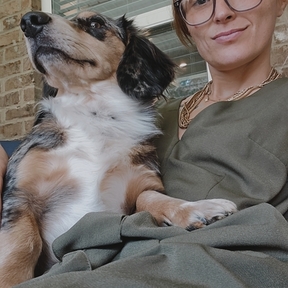-
Shauna Crowley
- Shauna Crowley - Cat Behaviorist and Trainer - Nationwide
-
 PREMIUM
PRO
PREMIUM
PRO
 PETWORKS
PICK
PETWORKS
PICK
 INSTANT
CHECKOUT
INSTANT
CHECKOUT
 RAPID
RESPONDER
RAPID
RESPONDER
- Worcester, MA - Having trouble with your feline fur child? Take advantage of my twenty five years of experience helping cats with all kinds of issues such as litter box...
-
(3 reviews)
-
- Certified
- BBB Accredited
- Online Sessions
- Book Now
-
Jessica Mockett
- Purrrfect Bonds Feline Behavior & Training - Cat Behaviorist - Nationwide
-
 PETWORKS
PICK
PETWORKS
PICK
 INSTANT
CHECKOUT
INSTANT
CHECKOUT
 RAPID
RESPONDER
RAPID
RESPONDER
- Clearfield, UT - Are you seeking personalized, holistic solutions that address the whole cat—not just symptoms? I'm a certified cat behavior consultant who specializes in felines only--my education and attention...
-
(11 reviews)
-
- Certified
- Insured
- Online Sessions
- Book Now
-
Kelly Citrin
- 4 On The Floor Dog Training and Behavior Consulting - Nationwide
-
 INSTANT
CHECKOUT
INSTANT
CHECKOUT
 CERTIFIED
CPDT-KA
CERTIFIED
CPDT-KA
- Rockville, MD - 4 On the Floor was founded by Kelly Citrin, CPDT-KA, MBA with the training philosophy of patience, persistence & positive reinforcement, including praise & play. We offer...
-
-
- Licensed
- Certified
- Online Sessions
- Book Now
-
Christine Epp
- Peaceful ConsultingAnimal Behaviorist - Nationwide
-
 PETWORKS
PICK
PETWORKS
PICK
 INSTANT
CHECKOUT
INSTANT
CHECKOUT
 RED CROSS
CERTIFIED
RED CROSS
CERTIFIED
- , - Struggling with pet routines, multi-pet dynamics, or household stress? I help pet parents build calm, balanced homes through remote behavioral and routine consulting. From new rescues to senior...
-
(7 reviews)
-
- Certified
- Book Now
-
Cherie Mascis
- AllPets Training and Behavior Solutions - Nationwide
-
 PETWORKS
PICK
PETWORKS
PICK
 INSTANT
CHECKOUT
INSTANT
CHECKOUT
 CERTIFIED
CPDT-KA
CERTIFIED
CPDT-KA
- Columbus, NC - I am a Pet Professional Guild Multispecies Training Professional, a Certified Professional Dog Trainer-knowledge assessed (CPDT-KA), an Association of Professional Dog Trainers (APDT) Canine Life and Social...
-
(2 reviews)
-
- Licensed
- Certified
- Insured
- Online Sessions
- Book Now
-
Laura P
- Kitty Faerie - Cat Behaviorist In Person - Nationwide
-
 PETWORKS
PICK
PETWORKS
PICK
 INSTANT
CHECKOUT
INSTANT
CHECKOUT
- Sunny Isles Beach, FL - In-Person Cat Behavior Support. I am a Feline Enrichment and Feline Behavioral Specialist, as well as Fear Free Pets certified professional, providing enrichment visits and...
-
(3 reviews)
-
- Certified
- Book Now
-
Maile Guenther
- Feline Behaviorist and Trainer - Nationwide
-
 INSTANT
CHECKOUT
INSTANT
CHECKOUT
- Anaheim, CA - Hello, my name is Maile [my•lee], and I’m a certified pet professional dedicated to enhancing the well-being of your furry companions. With certifications as a Feline Behaviorist...
-
(1 review)
-
- Certified
- Insured
- Online Sessions
- Book Now
- PetWorks Concierge ❤
- Cat Behaviorists - Nationwide
- New York, NY - For those in New York, NY, or anywhere in the U.S., finding a reliable and skilled cat behaviorist in New York, NY, is easier than...
-
-
- Licensed
- Certified
- Insured
- BBB Accredited
- Background Checked
- Online Sessions
- Request Quote
- Stacy Ferrara
- Pawsitive Potential - Certified Feline Behaviorist & Trainer - Nationwide
-
 RED CROSS
CERTIFIED
RED CROSS
CERTIFIED
- Plainview, NY - We offer in-home and remote consultations to help retrain unwanted behaviors your cat is exhibiting. Problems such as not using the litter box, displaying aggression towards other...
-
-
- Licensed
- Certified
- Request Quote
-
Heather Alvey
- Felidae Behavior Consulting - Cat Training Specialist - Nationwide
-
 INSTANT
CHECKOUT
INSTANT
CHECKOUT
- Minneapolis, MN - I am a Certified Feline Behavior and Training specialist. I can help you with: *Issues you are experiencing with your cat such as destructive scratching, aggression, house...
-
-
- Certified
- Background Checked
- Online Sessions
- Book Now
-
Jordan Padgett
- Third Coast Pets - Dog Trainer and Animal Behaviorist - Nationwide
-
 INSTANT
CHECKOUT
INSTANT
CHECKOUT
 RED CROSS
CERTIFIED
RED CROSS
CERTIFIED
- Fairhope, AL - As a certified Animal Behaviorist with a passion for enhancing the lives of pets, I have dedicated over [insert number of years] years to studying and addressing...
-
-
- Certified
- Online Sessions
- Book Now
-
Allison Hunter-Frederick
- Allison Helps Cats - Cat Trainer and Feline Behaviorist - Nationwide
-
 INSTANT
CHECKOUT
INSTANT
CHECKOUT
 RAPID
RESPONDER
RAPID
RESPONDER
- Lincoln, NE - Sometimes we all need a little (or a lot of) help with our cats. My mission is to help cats become cherished family members through the educational...
-
-
- Licensed
- Certified
- Insured
- Background Checked
- Online Sessions
- Book Now
-
Heather Crane
- Veterinary-Supervised Multi-Species Behavior Solutions - Nationwide
-
 INSTANT
CHECKOUT
INSTANT
CHECKOUT
- Houston, TX - At Sea Dog Animal Training (SDAT), we specialize in science-based, fear-free behavior training for dogs, cats, and exotic/non-traditional pets. Our mission is simple: Training Saves Lives. We...
-
-
- Online Sessions
- Book Now
- PetWorks Concierge ❤
- Cat Behaviorist - Nationwide
- Austin, TX - For those in Austin, TX, or anywhere in the U.S., finding a reliable and knowledgeable cat behaviorist in Austin, TX is simple and convenient! Petworks provides...
-
-
- Licensed
- Certified
- Insured
- BBB Accredited
- Background Checked
- Online Sessions
- Request Quote
-
Mark Hernandez
- People and Pets Energetics - Intuitive Pet Healing Coach - Nationwide
-
 INSTANT
CHECKOUT
INSTANT
CHECKOUT
- San Antonio, TX - My name is Mark Hernandez. I am an intuitive healer and coach that helps pets and pet parents with their health and well-being so that they...
-
-
- Licensed
- Certified
- Online Sessions
- Book Now
featured cities
- Cat Behaviorist Albuquerque
- Cat Behaviorist Atlanta
- Cat Behaviorist Austin
- Cat Behaviorist Baltimore
- Cat Behaviorist Boston
- Cat Behaviorist Charlotte
- Cat Behaviorist Chicago
- Cat Behaviorist Cleveland
- Cat Behaviorist Colorado Springs
- Cat Behaviorist Columbus
- Cat Behaviorist Dallas
- Cat Behaviorist Denver
- Cat Behaviorist Detroit
- Cat Behaviorist El Paso
- Cat Behaviorist Fort Worth
- Cat Behaviorist Fresno
- Cat Behaviorist Houston
- Cat Behaviorist Indianapolis
- Cat Behaviorist Jacksonville
- Cat Behaviorist Kansas City
- Cat Behaviorist Las Vegas
- Cat Behaviorist Los Angeles
- Cat Behaviorist Louisville
- Cat Behaviorist Memphis
- Cat Behaviorist Mesa
- Cat Behaviorist Miami
- Cat Behaviorist Milwaukee
- Cat Behaviorist Minneapolis
- Cat Behaviorist Nashville
- Cat Behaviorist New Orleans
- Cat Behaviorist New York City
- Cat Behaviorist Oklahoma City
- Cat Behaviorist Omaha
- Cat Behaviorist Philadelphia
- Cat Behaviorist Phoenix
- Cat Behaviorist Portland
- Cat Behaviorist Raleigh
- Cat Behaviorist Sacramento
- Cat Behaviorist San Antonio
- Cat Behaviorist San Diego
- Cat Behaviorist San Francisco
- Cat Behaviorist San Jose
- Cat Behaviorist Seattle
- Cat Behaviorist Tampa
- Cat Behaviorist Tucson
- Cat Behaviorist Tulsa
- Cat Behaviorist Virginia Beach
- Cat Behaviorist Washington DC
related articles
more info
Cat Behaviorist Services & What You Need to Know
What Exactly Does a Cat Behaviorist Do?
A cat behaviorist is a trained professional who helps diagnose and correct unwanted behaviors in cats. These cat experts understand feline psychology, communication, and environment-based triggers. They provide personalized guidance to address problems like:
Litter box avoidance
Aggression toward humans or other pets
Overgrooming or excessive scratching
Anxiety and stress behaviors
Territorial marking and spraying
Fearful or reclusive behavior
Cat behaviorists work with cat parents virtually or in person to create actionable, humane plans that respect your cat’s needs and personality.
Benefits of Cat Behavior Consultations
Personalized behavior plans: Tailored to your cat’s history, age, and living environment
Science-based methods: Reward-focused, positive reinforcement strategies
Online convenience: Get professional support from anywhere
Multi-cat household solutions: Strategies to reduce conflict and improve harmony
Stress reduction: Improve your cat’s emotional wellbeing and your bond
Long-term behavior improvement: Create lasting positive change
Typical Pricing for Cat Behaviorist Services in 2026
Initial online consultation: ~$75–$200 per session
Follow-up sessions: ~$50–$150 per session
Extended behavior packages: $250–$600+ for multiple sessions and follow-up support
In-person evaluations: Often higher than online visits, depending on travel and session length
Online consultations are increasingly popular because they’re convenient, effective, and allow behaviorists to coach you in real time while observing your cat’s environment.
How to Choose a Cat Behaviorist
When seeking a professional:
Look for credentials: Training in animal behavior, feline science, or clinical behavior. Important certifications include CAAB (Certified Applied Animal Behaviorist), CCBC (Certified Cat Behavior Consultant), CPBC (Certified Professional Cat Behavior Consultant), or degrees in veterinary behavior/animal science.
PetWorks cat behaviorists bring years of real‑world experience 🐾 helping felines and their families. Some have 2 to 15+ years working specifically with cats to address complex issues like litter box avoidance, aggression, anxiety, and multi‑cat household dynamics. With extensive hands‑on practice and ongoing education in feline behavior science, these professionals are equipped to help your cat thrive in a calm, balanced home. Schedule a session 🩺 to benefit from seasoned expertise tailored to your cat’s unique needs.
Ask the pros about specific experience accomplished towards: Success with litter box issues, aggression, anxiety, or multi-cat dynamics.
Ask about methods: Humane, positive, and evidence-based approaches.
Read reviews: Feedback from cat parents with similar behavior issues.
Confirm format: Online, in-person, or hybrid options
A good behaviorist will listen, assess your cat’s needs, and partner with you to create a plan that’s realistic, safe, and effective.
Cat Behaviorist FAQs
1. What issues can a cat behaviorist help with?
Cat behaviorists address litter box problems, spraying, aggression, anxiety, scratching, excessive vocalizing, and fear responses.
2. How does an online cat behavior consultation work?
Online consultations are typically video calls where the behaviorist observes your cat, asks questions, and gives actionable guidance for you to implement immediately.
3. How many sessions are usually needed?
Some cats improve after one session, while more complex cases benefit from multiple follow-ups or extended coaching packages.
4. Are behavior consultations effective for older cats?
Yes. Cats of all ages respond well to behavior plans tailored to their needs and consistent owner involvement.
5. Can a cat behaviorist help with multi-cat household issues?
Absolutely. Specialists assess social dynamics and provide strategies to reduce conflict and promote harmony.
6. Do cat behaviorists use punishment?
No. Reputable behaviorists use positive, reward-based, humane methods, never punishment.
7. Should I consult my vet first?
Yes. It’s helpful to rule out medical causes for behavior issues. Many behaviorists work alongside veterinarians when needed.
Get expert help for your cat’s behavior today. Book a certified cat behaviorist on PetWorks! Science-based, humane solutions and personalized guidance are just a few clicks away, helping your cat thrive and your home stay happy.
You may also consider booking these pet care services:
Cat Behaviorist by State




















